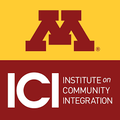|
DREAM Weekly Email - Disability and Higher Education in the News: September 18-24, 2022
From DREAM: Disability Rights, Education, Activism, and Mentoring Sponsored by the National Center for College Students with Disabilities at the University of Minnesota’s Institute for Community Integration, in collaboration with the Association on Higher Education And Disability (AHEAD) This week’s newsletter and archived newsletters are available Monday at www.DREAMCollegeDisability.org. Top Stories This Week (in no particular order)
General News
COVID-19 and Monkeypox News
BIPOC and Diversity News
International News
Students, Staff, Faculty in the News
DREAM and the NCCSD are funded through a U.S. Department of Education grant (P116D150005) to the Institute on Community Integration at the University of Minnesota, in partnership with AHEAD. For more information about DREAM, send an email to DREAM@ahead.org. This newsletter is available in other formats upon request. If you have difficulty accessing articles, please let us know and we may be able to help. To subscribe or unsubscribe, please go to http://ahead-listserve.org/mailman/listinfo/dream_ahead-listserve.org. DREAM can also handle requests to subscribe or unsubscribe. By the way, please don't presume DREAM, the NCCSD, the University of Minnesota, AHEAD, or the U.S. Department of Education agree with everything we send out - we're just passing along the information so you can form your own opinions. Thanks. DREAM, the NCCSD, and the Institute on Community Integration at the University of Minnesota recognize thay are based within the traditional homelands of the Dakota people. “Minnesota” comes from the Dakota name for this region, Mni Sóta Maḳoce, which loosely translates to the land where the waters reflect the skies. It is important to acknowledge the peoples on whose land we live, learn, and work as we seek to improve and strengthen our relations with our tribal nations. We also acknowledge that words are not enough. We must ensure that our institution provides support, resources, and programs that increase access to all aspects of higher education for American Indian students, staff, faculty, and community members.
0 Comments
|
AuthorWrite something about yourself. No need to be fancy, just an overview. Archives
October 2022
Categories |
DREAM is supported under a grant from the U.S. Department of Education (P116D150005) to the Institute on Community Integration (ICI) at the University of Minnesota-Twin Cities and is run in collaboration with the Association on Higher Education and Disability. Opinions expressed here are not necessarily those of the U.S. Department of Education, ICI, or AHEAD. If you have need assistance with the site or have questions, contact us.
 RSS Feed
RSS Feed

